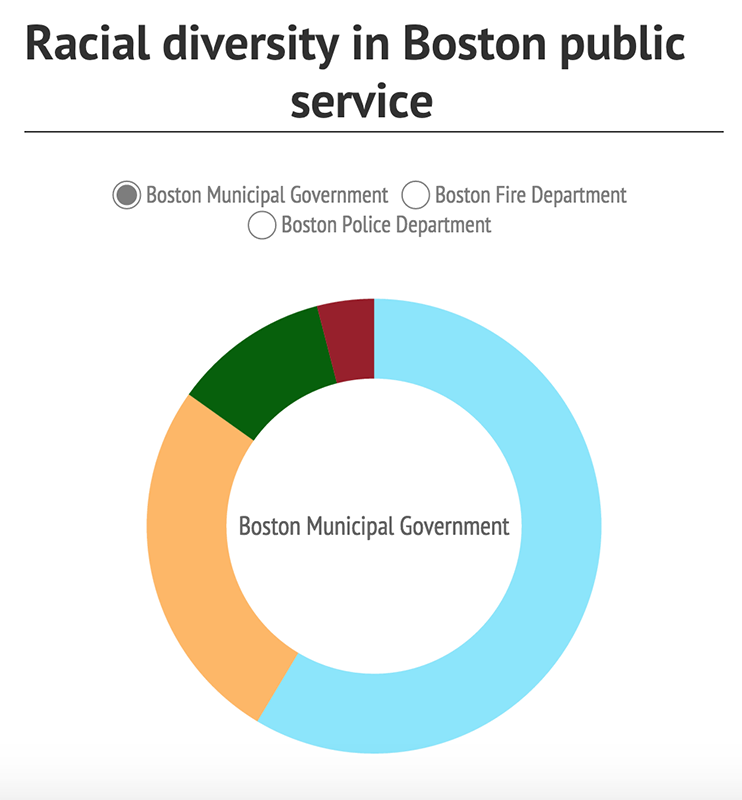A report examining the diversity of Boston’s municipal employees found that the Boston Police and Fire Departments, among others, have low minority representation, according to a Tuesday press release.
The Workforce Profile Report, released by the city’s Office of Diversity, found racial and gender disparities in the city’s municipalities and posed possible solutions to remedy the issue.
The report also compared the racial and gender makeup of Boston municipal workers to those of other cities nationwide.
“We were able to take an in-depth look at each department to see where we can improve and specifically what we need to do to reach our goals,” said Boston Mayor Martin Walsh in the release. “It is our priority to not only improve the numbers but to create a strong pipeline that will ensure we are finding the best talent and cultivating that talent for positions throughout City Hall.”
Approximately 58 percent of Boston’s municipal workers are white, 26 percent are black, 11 percent are Hispanic and 4 percent are Asian, the report stated. Overall, 47 percent of municipal workers are male.
“These reports allow local government to track the diversity of their workforce,” Shaun Blugh, the city’s chief diversity officer, wrote in an email. “As representatives of the residents of the respective cities, it is important for the composition of the local government employee base to be reflective of the constituents and neighborhoods they serve.”
Boston’s police and fire departments, which possess more than half of the City’s turnover opportunity for the next five years, were among those with the least minority representation, Blugh said. This is something the city is working to address, he said.
The report outlines possible steps to abate the issue, such as increasing diversity training and employee research groups, creating a diversity officer position for the Boston Fire Department and reinstating the Boston Police Department’s cadet program, Blugh said.
“We will collaborate internally and externally to recruit more diverse talent to the City of Boston workforce and create pipelines for internal talent to advance within the organization,” he said.
Peter DiDomenica, lieutenant detective at the Boston University Police Department, said recruiting diverse workers for the department could establish trust within the community.
“When we have an opportunity to hire, we’re seeking out publication and means of communication, between social media, Internet, and community groups to get the word out that we’re hiring and we would like people in this community to work for us,” he said. “It takes a proactive approach and it takes active recruitment to reach the levels of diversity that we should be achieving and we’re trying.”
Blugh said the lack of diversity in municipal workforces is an issue nationwide.
“The Workforce Profile Report was an essential step in outlining the key areas in which we, at the City of Boston, can improve,” he said. “The Office of Diversity has also been working with [human resources] to aid the recruiting efforts for open positions, as well as meeting with department heads internally discussing ways in which we can develop internal diverse talent for opportunities for upward mobility in City government.”
DiDomenica said BPD is working hard in its efforts to reach out to communities in order to establish trust and recruit from them
“When I’m looking at the Boston Police, I think they’re doing a really good job in trying to build that level of trust, trying to get the word out that we represent the people, we want our department to represent the people we protect,” he said. “We want you to trust us, we want you to be a part of us.”
Several residents expressed surprise about diversity in city municipalities and a desire for change within the Boston workforce
Evelyn Friel, 74, of Brighton, said it is time for a change to occur in the workforce in order to allow room for a larger minority presence.
“I would assume that the majority of the workforce is white,” she said. “It’s time to change, you know, give everybody an equal chance and break the pattern.”
Jason Milton, 39, of Roslindale, said he has experienced great diversity in Boston and would like to see how the city compares with the rest of the nation in regards to the issue.
“I’ve been a Boston resident all my life, and I grew up in a very diverse area. I grew up in Roslindale, which is as diverse as it gets,” he said. “I know that, you know, in certain jobs sometimes things like underrepresentation happen, but I have friends who work on the police department, fire department, who are of all nationalities.”
Erin Long, 26, of Allston, said if there is any sort of underrepresentation of minorities in Boston, then it should be addressed and fixed.
“I don’t know too much about the issue, but if there is any racial inequality or underrepresentation being perpetuated within Boston, then that’s definitely a bad thing,” she said. “I’m glad it’s being looked into and, hopefully in the long run, ended.”
Mina Corpuz contributed to the reporting of this article.




















































































































James Berlo jr. • Apr 21, 2015 at 12:40 pm
the Boston Bruins have no Women or “minorities” , the Celtics have no Woman and too many blacks and the Sox have NO Woman and not the right proportion on the above ( and these are just Games , why does the City of Boston allow them to do business in Boston?
they should be more concerned about the corruption of the BFD and the racial abuses ( I know I worked there over 22 years, its an Irish Gang) and the corruption of the BPD